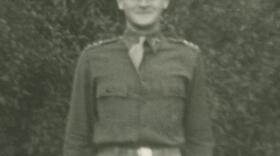We speak with New Hampshire author Paul Levy about his new book called Finding Phil: Lost in War and Silence. Levy describes his search to uncover the life, and death, of an uncle he never knew, who died in World War II.
This show originally aired on September 28th, 2016.
GUEST:
- Paul Levy - Retired poverty lawyer and professor who taught at Indiana University and Smith College, before serving on the faculty of a progressive adult learning program at Springfield College.
SHOW HIGHLIGHTS:
Paul Levy set out to learn about the uncle he never knew and heard little about growing up -- Phil Levy, who died during World War II in a lesser-known yet critical battle known as Operation Dragoon.
The idea was that the southern troops would land and move north to meet the Normandy troops; they would form a north-south line in France and then start moving east across Belgium and through the rest of France and into Germany and to Berlin and victory. And with a couple of hiccups along the way that’s essentially what happened.
Here is a map of the operation:

For years, Paul Levy knew only a handful of details about his uncle: He played the drums, attended the University of Michigan, and was married. Levy decided to dispel the silence that had settled over his uncle's life, finding several people who had known him during the war, including a 90-year old veteran, who picked up the phone in his Long Island home and said right away that he remembered Phil.
We talked a while, and he says, `I'll be back in a second.' And he leaves the phone for about 20 seconds. He comes back -- he had obviously grabbed a letter that was near at hand -- and he says, 'This is a letter I sent home to my mom.' In the letter, he says, 'You might have noticed that my commanding officer was Phil Levy from Southbend, Indiana -- by far, the swellest guy I've met in the army.'
Phil Levy died in France only months before the war ended. His tank platoon had hit some heavy fighting in frigid conditions, which he described in a letter to his brother-in-law:
My life here is pretty rugged. It’s colder than hell and the tanks are like refrigerators, with quarter inch of frost on the outside. Just came back from inspecting my outposts. Nothing new. Carried another GI back. Artillery barrage. Damn shame -- Christmas eve, too. I’ve been 'bazookaed,' 'Panzerfausted,' hit mines, done everything a man can do. But I’ve been extremely lucky… I’ll be glad to see the end of this war.”

Paul Levy describes his chilling discovery of Wolf Zoepf, a German officer who wrote a book about his experiences in the war and describes the moment he destroyed the very tank Levy's uncle Phil was in. To the left, is a photograph of Zoepf.
Levy said he became interested in learning more about Zoepf, who had served in Hitler's Waffen-SS unit -- a group singled out as war criminals at the Nuremberg trials. Yet, years after the war, Zoepf helped organize several reunions of American and German veterans and was described by some American veterans as "humanitarian."
Exchange listener Lisa, of Whitefield, sent in this email about her family's WWII experience:
My mother, Louise, was in WWII as a nurse with the 131st Evac. Her unit spent some time at a concentration camp in Austria, Mauthausen, taking care of the survivors after the camp was liberated. I remember going to this camp's memorial when I was very young, however she never really spoke about her experience's and the horrors she saw till later in life. She always said that she just felt she was doing her job. It was after she went to a ceremony in the 90's celebrating the liberation when she met some survivors that she realized the impact she and her fellow nurses had.






